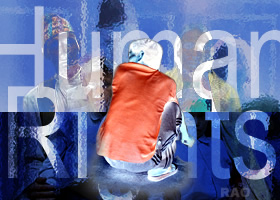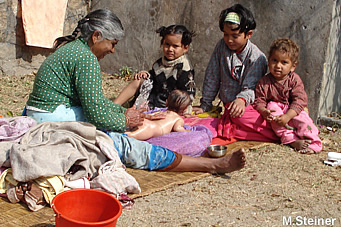|
|
|
Human
Rights & Social Justice
|
|
|
|
UN
report: Nepalese children still face serious human rights violations
|
 |
United
Nations, Security Council, 18 April 2008
Grave
violations against children have not stopped in Nepal, although they have
fallen significantly in number since the signing in 2006 of the comprehensive
ceasefire agreement ending the Asian country's protracted armed conflict,
a new United Nations report says.
 |
| The
report from Secretary-General Ban Ki-moon, released today, includes a series
of recommendations calling for the enhanced legal protection of minors
and stepped-up measures to end the recruitment of children by armed groups
and reintegrate child soldiers back into the general community.
It
finds that many children were recruited by the Communist Party of Nepal-Maoist
(CPN-M) just before the accord was signed in 2006 and that no progress
has since been made in formally discharging them, although some have been
released informally. |
|
Emerging
social unrest in the Terai region in the country's south have also posed
new risks for children, including recruitment by armed groups, according
to the report, which covers the period from October 2006 to the end of
last year.
Moreover,
across the country, all major political parties are increasingly willing
to use children in their political demonstrations, strikes and blockades.
The
report recommends that the Government should take 'significant steps' in
the areas of legal reform, accountability and reconciliation, including
enacting a law that criminalizes the recruitment of persons aged less than
18 by armed groups.
'It
should take further steps to ensure that law enforcement agencies and the
courts investigate and prosecute crimes against children and strengthen
legal institutions to ensure that human rights issues are addressed and
also to ensure that any strengthening or reform of law enforcement and
criminal justice systems are in line with international standards,' the
report states.
Further,
the Government should 'make a clear commitment to the reintegration of
children associated with armed forces and armed groups,' in part by working
with the UN and the CPN-M to set up an effective programme for the release
and reintegration of such children.
Turning
to the CPN-M, the report calls on the party to take urgent steps to enter
into a concrete action plan with the UN to implement its earlier commitment
for the immediate and unconditional release of children in Maoist army
cantonments. It also calls on the party to end the obstacles to the reintegration
of informally released children.
The
report has been released less than two weeks after Nepalese voters went
to the polls in historic elections to select the members of a Constituent
Assembly, which is tasked with drafting a new constitution for the country.
 |
|
Report
of the Secretary-General on children and armed conflict in Nepal (S/2008/259)
|
 |
Summary
The
present report, prepared pursuant to the provisions of Security Council
resolution 1612 (2005), is presented to the Council as the second country
report on the situation of children and armed conflict in Nepal. It covers
the period from 1 October 2006 to 31 December 2007 and follows my first
report (S/2006/1007) and the subsequent conclusions and recommendations
of the Working Group on Children and Armed Conflict (S/AC.51/2007/8).
 |
| The
report indicates that although grave violations of children's rights have
decreased significantly since the signing of the comprehensive ceasefire
agreement, violations against children have not ceased. The report notes
that substantial numbers of children were recruited by the Communist Party
of Nepal-Maoist (CPN-M) prior to the signing of the ceasefire agreement
and moved into cantonments. No progress has been achieved in securing their
formal discharge although many have been released informally. |
|
The
report also notes that social unrest in the Terai region has contributed
to a pattern of protests and emergence of political and armed groups that
have created new risks for children, including recruitment. In particular,
the report highlights the increasing use of children by all major political
parties in political demonstrations, strikes and blockades.
The
present report makes a number of recommendations, including recommendations
that the CPN-M agree to a concrete, time-bound action plan to implement
its commitment to release children in the Maoist army; and end obstacles
to the reintegration of informally released children. It also recommends
that the Government of Nepal make a clear commitment to the reintegration
of children associated with armed forces and armed groups, and that it
enhance the legal protection of children, by criminalizing child recruitment
and prosecuting violators of children's rights. The report also calls on
armed groups in the Terai to end violations of children's rights, and on
political parties to end the use of children in demonstrations, strikes
and blockades.
I.
Introduction
1.
The present report, prepared in accordance with the provisions of Security
Council resolution 1612 (2005), covers the period from 1 October 2006 to
31 December 2007 and follows my first report on the situation of children
and armed conflict in Nepal (S/2006/1007) and the subsequent conclusions
and recommendations of the Working Group on Children and Armed Conflict
(S/AC.51/2007/8). The report examines trends in violations of children's
rights in the volatile aftermath of Nepal's decade-long armed conflict,
with a focus on the six grave violations listed in the resolution: killing
and maiming of children; recruitment and use of children as soldiers; abductions;
sexual violence; attacks on schools and hospitals; and the denial of humanitarian
access to children.
2.
Grave violations of children's rights have decreased significantly since
the signing of Nepal's Comprehensive Peace Agreement in 2006. The peace
process as a whole has made important progress in a short time frame. However,
violations against children have not ceased:
(a)
Substantial numbers of children were recruited by the Maoist army just
before the signing of the Comprehensive Peace Agreement. No progress was
achieved in securing the formal discharge of these children although large
numbers have been informally released;
(b)
Social unrest linked to long-standing issues of exclusion has contributed
to a steady pattern of protests and the emergence of political and armed
groups in the southern Terai plains that have created new risks for children,
including displacement, killings and recruitment;
(c)
Despite the Government's efforts, public security has been undermined in
many areas as State law enforcement agencies have not yet been able to
extend their reach in a way that allows them to address security problems
consistently or effectively. Political parties and movements are involved
in widespread and sometimes violent street protests and strikes, and children
are frequently drawn into risky forms of participation in public demonstrations,
strikes and blockades.
 |
|
More
information
|
UN
Security Council
Report
on children and armed conflict
Full
summary 64
KB
|
|
Source:
United NationsSecurity Council, 18 April 2008
top

|

|
|
UN
|
top

|







